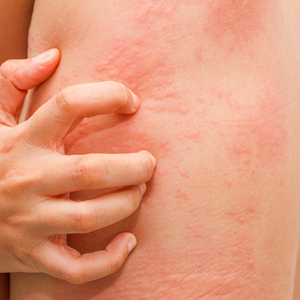Quick Links
When swollen, itchy bumps appear on your skin, it may be that you are suffering from hives – also known as urticaria. Hive plaques are sometimes skin-colored but usually slightly reddened in appearance with clearly defined edges, and they will blanche or whiten when pressure is applied to them. Hives do not have a regular shape and can grow or shrink irregularly, or even appear to move around within your skin. They may sometimes be referred to as weals or welts and they can burn or sting.
An outbreak can appear quite suddenly and disappear just as quickly within a few hours, although some people will have persistent symptoms that can last for months. It is rare for hives to leave behind any permanent scars unless the skin has been damaged by excessive scratching at the affected area.
What Causes Hives?

Hives appear as the result of specialized cells within the body known as mast cells releasing histamine in response to a stimulus or infection. The condition is not contagious but the trigger that causes the skin reaction may be something that can be passed from person to person.
Most people get hives on the trunk (chest, stomach, and back), but may experience it on the face, hands, neck, and lips too. This skin condition can affect anyone, although hives in babies are common, as well as in toddlers and children. Young adults are more likely to experience a longer-lasting (chronic) bout of hives, and women can be particularly susceptible to it during pregnancy.
Certain foods can initiate a bout of hives. These include fish, shellfish, nuts, eggs, and milk. Other substances such as pet dander and insect bites have also been known triggers. In addition, some people may show a skin reaction to certain medications.
An outbreak of hives from stress, anxiety, or illness is not uncommon if you are susceptible to this condition. Physical stimuli can also prompt an outbreak.
Important Note on Hives & Anaphylaxis
Hives can be a feature of a much more serious process called anaphylaxis. The release of histamine through the body can bring about an increase in pulse rate, dizziness, wheezing, and shortness of breath along with feelings of tightness in the throat and swelling of the tongue or face. People with a history of asthma or an exaggerated response to allergens are particularly vulnerable.
If you experience any of these symptoms, call 911. You may require emergency treatment.
Short Term & Long Term Hives
Over the years, hives/urticaria of different types have been categorized and subdivided in a number of ways, but the most common form that we see falls into one of two categories according to how long it lasts:
Short-Term Hives (Acute Urticaria)
Red, itchy lesions last from hours to days and fade completely in less than 6 weeks. Acute hives usually result from an allergen or other trigger (heat, pressure from tight-fitting clothing, stress, medications, etc.)
Long-Term Hives (Chronic Urticaria)
Hives last more than 6 weeks and are most common in young adults, although anyone is susceptible. Pinpointing the cause can be difficult, and may include:
- Ingested substances (e.g. food, additives, drugs),
- Inhaled substances (e.g. dust, feather, pollen),
- Injected substances (e.g. drugs, stings, bites, and even blood transfusions),
- Infectious substances (e.g. bacteria, viruses, fungi), and
- Underlying internal diseases (e.g. thyroid disease, lupus).
Short-term hives can be easily treated and generally disappear quickly without scarring. Chronic hives can be more difficult to eradicate, but the Trillium Creek Dermatology skin experts have the knowledge and experience required to manage even the most persistent cases effectively over the long term. We are serving the following communities and those surrounding: Wooster, Wadsworth, Medina, Brunswick, Strongsville, and Hinkley.
Other Hive Types
A few of the other sub-categories of hives worth mentioning are physical urticaria, PUPPP, and Angioedema.
Physical Hives / Physical Urticaria
This is a specific form of hives where the trigger is environmental or physical in nature. Common triggers include exercise, heat, cold, sunlight, pressure, and vibration.
PUPPP (Pruritic Urticarial Papules and Plaques of Pregnancy)
PUPPP is the most common skin condition associated with pregnancy and usually affects the skin on the abdomen of pregnant women, particularly during their first pregnancy. As the skin stretches the condition can become more intense so it is not uncommon for women to have more discomfort from hives in their third trimester. Symptoms include redness, small lesions and itching which can last 1 to 6 weeks. PUPPP does not pose any serious threat to either mother or baby and it rarely returns in subsequent pregnancies.
Angioedema
This is a co-condition that may appear alongside hives although it can occasionally occur in isolation. Angioedema affects deeper layers of the skin causing a build-up of fluid. As a result, the skin appears swollen and mucous membranes become congested. Areas most commonly affected are around the eyes and mouth, although other parts of the body can be affected too. The swelling can be severe and emergency treatment should be sought if it affects the breathing.
Hives Treatment
Your Trillium Creek Dermatology skin expert will help you to identify what is triggering your hives so that they can be avoided or eliminated. There are a number of specific creams and tablets that work very well in treating hives. These include antihistamines and prednisone. In cases of PUPPP, our clinical team will ensure that your medication is safe to use during pregnancy.



